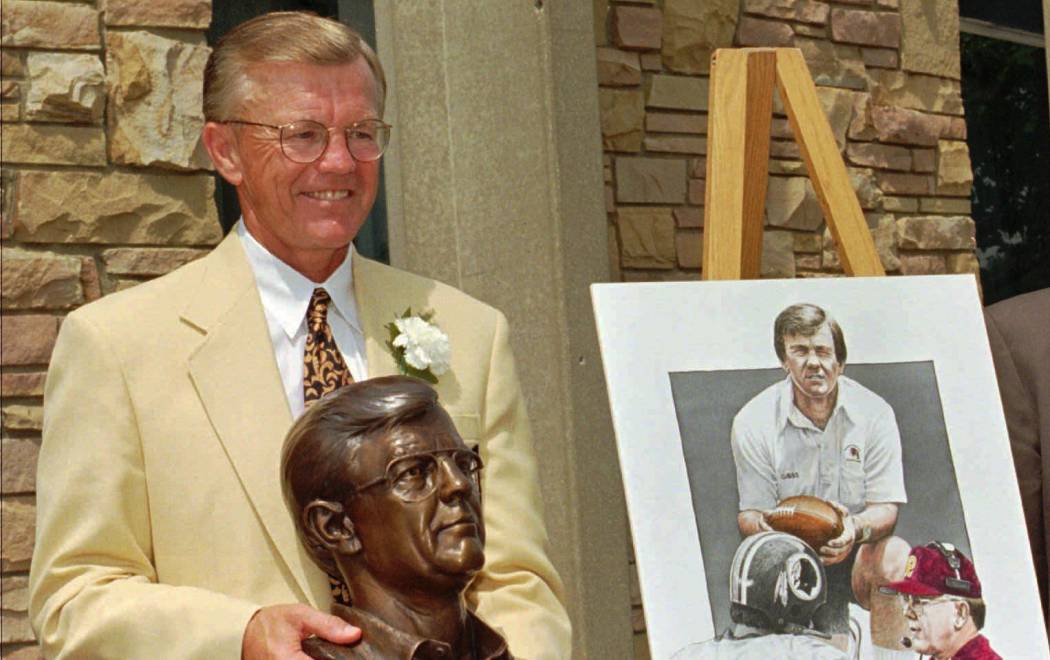Gold Jacket Spotlight: Joe Gibbs Overcomes Rough Starts

Joe Gibbs and friends can laugh now about some of the early struggles in his two-lane career. Many a day passed, however, when a Bronzed Bust in Canton and a spot in the NASCAR Hall of Fame – he is the only person with both – seemed unlikely, if not impossible.
A member of the Pro Football Hall of Fame’s Class of 1996, Joe steps into the Gold Jacket Spotlight this week as a multi-time winner of championships in two sports.
Joe began his football coaching career as an unpaid volunteer at age 24. Progressing through the college ranks, he learned from some great coaching legends: Don Coryell and John Madden at San Diego State, John McKay at Southern Cal and Frank Broyles at Arkansas.
After nine collegiate seasons, he got his first opportunity in the National Football League in 1973, reuniting with Coryell as an offensive backfield coach with the St. Louis Cardinals. One season with McKay in Tampa Bay and two with Coryell in San Diego as offensive coordinator primed Joe to fulfill his dream of becoming a head coach.
In 1981, Bobby Beathard was entering his fourth season as general manager in Washington without a playoff appearance. Owner Jack Kent Cooke was growing impatient and asked Bobby who he wanted to hire as the team’s new coach.
“Joe Gibbs? Who’s Joe Gibbs?” Beathard recalls Cooke responding incredulously when he threw out the name. “They’ll crucify me if we hire Joe Gibbs.”
Beathard said that after an 0-3 start, Cooke growled, “Come to my house – and bring that coach of yours.”
They were told it was time to win, but two more losses followed.
With an 0-5 record, “I was looking for different ways home at night,” Joe told NFL Films. “I didn’t want anybody to know where I was.”
Hall of Fame guard Russ Grimm remembers Joe saying, “I may be the first guy to get fired without even winning a football game.”
Joe recalled one more encounter with Cooke before his fortunes turned.
“He said, ‘Joe, you won’t believe what they are calling me when we leave that stadium.’ I said, ‘Yes, sir, I will, because they are calling me the same thing.’”
The breakthrough came in Week 6, a 24-7 road victory in Chicago. The team won seven more times, including its last three games, to close with a respectable 8-8 record that set the stage for the first of Joe’s three Super Bowl victories the following season.
“That 0-5 (start), I think that actually led to the Super Bowls, because all those guys that went through that with me, believe me, none wanted to go back to that horrible, miserable feeling,” Joe told NFL Films. “It motivated us for a long time.”
Joe won Super Bowls following the 1982, 1987 and 1991 seasons, becoming the only coach to win three Vince Lombardi Trophies with three different quarterbacks. He was named NFL Coach of the Year twice and won 124 games in 12 seasons before retiring after the 1992 season to devote his full attention to auto racing.
Joe’s racing team got off to an equally bumpy start: a wreck in qualifying for the 1992 Daytona 500 – the first race on NASCAR’s calendar and its biggest – and a 36th-place race day result. They finished in the Top 10 only eight times in 29 races.
Year 2, however, said Joe Gibbs Racing driver Dale Jarrett capture the coveted Daytona 500 and post 18 finishes in the Top 10 in 30 races.
Since 2020, JGR drivers have won five Cup Series championships.
Beathard said that once he and Joe started winning, Cooke called them back into his office. “He said, ‘You’re the coach I’ve always wanted, Joe,’” Beathard recalled, chuckling. “Joe and I still laugh to this day about that.”
Joe’s journey proves it’s not how you start life’s races that matters but how you finish them.
Stories From The Hall of Fame Archives: Friedman first NFL QB with 'computer in his head'
Benny Friedman was the catalyst for how the quarterback position would be played moving forward.
PRO FOOTBALL HALL OF FAME TO OPEN 'GRIDIRON GLORY' IN MYRTLE BEACH, S.C.
EXHIBIT TO OPEN NEXT MONTH AT STATE’S NO. 1 TOURIST DESTINATION